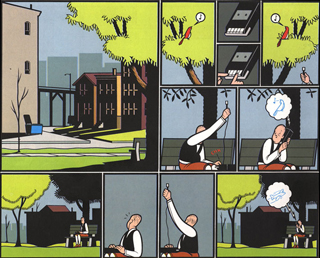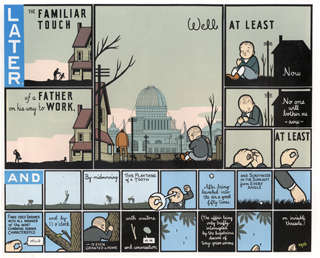




Murder Slim Review: JIMMY CORRIGAN
A 2001 COMIC BOOK COLLECTION BY CHRIS WARE
JIMMY CORRIGAN is generally recognised as one of the greatest comic books. The extensive praise for it is spread in tiny writing over the first two pages of the (huge) graphic novel. The Guardian made it their "best first book of 2001", the first time a graphic novel has won such an award from a major UK newspaper. It won a slew of other awards too, and the New York Times says it is "arguably the greatest achievement of the form, ever." Well, sorry, Murder Slim doesn't agree.
I hate reviews that use metaphors or similes to describe something. I remember Jason Starr comparing a 100 BULLETS collection to "crack-cocaine" because he said it was so "exhilarating and addictive." Ludicrous.
But I'll make a slight exception for this one, stealing what a couple of reviewers have said. "JIMMY CORRIGAN is the CITIZEN KANE of comics." In their case, it's because they consider it the best comic just as they often list CITIZEN KANE as the best movie.
For me, the comparison is different. Both are sprawling, both exploit their forms in trailblazing ways, both look fucking great, but I don't love either them. I feel like I can appreciate both CORRIGAN and KANE but I can't say either really gets to me. My main issue with CORRIGAN is the thin storyline, which is stretched over 380 densely detailed pages.
It starts with the present day Jimmy, a hugely nervous guy who's dominated by his mother. He decides to contact his long-last father, and has an awkward day or so with him. The story then has various extended flashbacks to Jimmy's grandfather, who is having his own problems as a lovelorn and lonely kid some eighty-plus years before.
Ware links to the two characters in terms of their situation and through a lot of clever visual touches. A fork at Jimmy's table will be echoed by a pitchfork a few pages later in the past. Superman - both in models and his dreams - is a reoccurring image, constantly reminding Jimmy of the possibility of suicide. In the eighty-years-ago story, his grandfather becomes obsessed by a small metal horse, which represents escape from the death and isolation that surround him. JIMMY CORRIGAN will keep offering up stuff for multiple reads, just as KANE does for multiple watches. The problem is, the story and language didn't grab me enough to draw me back to it.
A number of pages are about Jimmy sitting and looking nervous. This drags out scenes that don't benefit it. Ware is, of course, trying to capture the awkwardness of time but his art is so beautiful he could achieve it in far less panels. Very little happens in the book until it kicks into life in the final third. The story of Jimmy's grandmother is actually more eventful, despite accounting for less of the book.
You plug for the little kid... who maybe is the smartest kid in the world. He looks like an old man lost in a world of kids and repression. But these sections of the book are hamstrung by Ware's obsession with poncey use of unnecessary long words. These are often intended to be funny, but are usually annoying because they further drag out your read.
Hell, look, I don't want to attack this book too much. It's incredibly drawn with expressive characters and it has beautiful sense of movement, time and location. I still think it's worth a read, but all the accolades for the book from non-comic readers should flag up a warning sign. They are often applying their own non-comic acceptance of slow stories and laboured language that they eagerly lap up in Booker Prize winning novels. It's the same reason these same critics masturbate over SANDMAN.
The beautiful pictures can't distract from the fact that comic fans generally respond a lot more to pace and energy. And there are 100 comics that deliver more of that than JIMMY CORRIGAN does.
Review by Steve Hussy


MurderSlim.com








